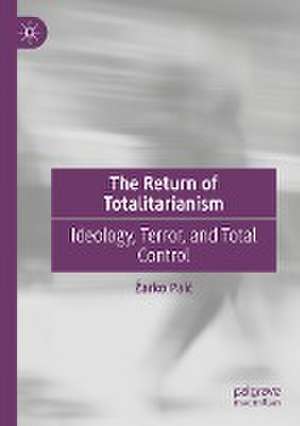The Return of Totalitarianism: Ideology, Terror, and Total Control
Autor Žarko Paićen Limba Engleză Paperback – 8 dec 2023
| Toate formatele și edițiile | Preț | Express |
|---|---|---|
| Paperback (1) | 723.06 lei 43-57 zile | |
| Springer International Publishing – 8 dec 2023 | 723.06 lei 43-57 zile | |
| Hardback (1) | 727.38 lei 43-57 zile | |
| Springer International Publishing – 8 dec 2022 | 727.38 lei 43-57 zile |
Preț: 723.06 lei
Preț vechi: 881.78 lei
-18% Nou
Puncte Express: 1085
Preț estimativ în valută:
138.35€ • 144.84$ • 114.48£
138.35€ • 144.84$ • 114.48£
Carte tipărită la comandă
Livrare economică 07-21 aprilie
Preluare comenzi: 021 569.72.76
Specificații
ISBN-13: 9783031189449
ISBN-10: 3031189442
Ilustrații: VIII, 225 p.
Dimensiuni: 148 x 210 mm
Greutate: 0.31 kg
Ediția:1st ed. 2022
Editura: Springer International Publishing
Colecția Palgrave Macmillan
Locul publicării:Cham, Switzerland
ISBN-10: 3031189442
Ilustrații: VIII, 225 p.
Dimensiuni: 148 x 210 mm
Greutate: 0.31 kg
Ediția:1st ed. 2022
Editura: Springer International Publishing
Colecția Palgrave Macmillan
Locul publicării:Cham, Switzerland
Cuprins
1. Introduction.- 2. Totalitarianism without Subject: The End of the Total State and the "Ideology" of the Corporatism.- 3. The Mystery of New Beginning: Hannah Arendt and the Political Modern Times.- 4. Metapolitics and Evil.- 5. The Triumph of Political Religions: Identity Politics and the Twilight of Culture.- 6. Ideology, Terror, Control: Does Totalitarianism have a Prospect for the Future?.- 7. Conclusion.
Notă biografică
Žarko Paić is a Professor at the University of Zagreb, where he teaches courses in Aesthetics and Media Theory. He publishes frequently in philosophy, social sciences and art theory. His publications include White Holes and the Visualization of the Body (2019), Neoliberalism, Oligarchy and the Politics of the Event (2020), and Art and the Technosphere (2022).
Textul de pe ultima copertă
This book enters into a detailed discussion with many theorists of totalitarianism, and demands a re-evaluation of approaches that speak of mass manipulation of people and ideological control mechanisms. Žarko Paić shows that totalitarianism cannot be only a political-ideological problem, but rather a problem of the relationship between the technosphere, political power, and the narcissistic culture of the spectacle, which offers postmodern revisionism and forgetfulness of history as opposed to brave civic participation in the public sphere of acting together. He investigates the transformations the political and cultural processes linked to the notion of ‘totalitarianism’ undergo in the contemporary world, and the transformations (and differences) that this notion expresses today in comparison to what was realized by fascism, Nazism, and Stalinism in the 20th century.
Žarko Paić is a Professor at the University of Zagreb, where he teaches courses in Aesthetics and Media Theory. He publishes frequently in philosophy, social sciences and art theory. His publications include White Holes and the Visualization of the Body (2019), Neoliberalism, Oligarchy and the Politics of the Event (2020), and Art and the Technosphere (2022).
Žarko Paić is a Professor at the University of Zagreb, where he teaches courses in Aesthetics and Media Theory. He publishes frequently in philosophy, social sciences and art theory. His publications include White Holes and the Visualization of the Body (2019), Neoliberalism, Oligarchy and the Politics of the Event (2020), and Art and the Technosphere (2022).
Caracteristici
Written for those interested in contemporary political philosophy, sociology, and globalization studies Presents a detailed discussion with many theorists of totalitarianism Shows that totalitarianism cannot be only a political-ideological problem
